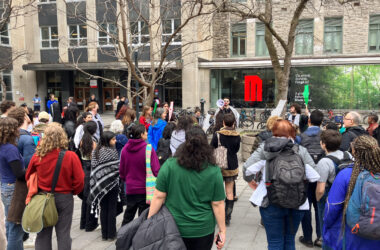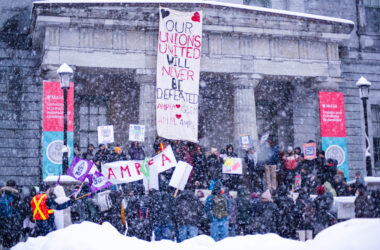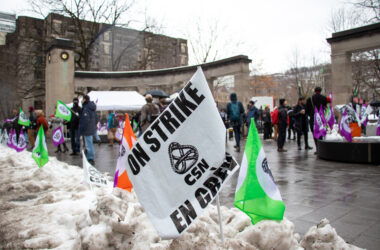The struggle between McGill and MUNACA over pensions, wages, and compensation has just entered its fifth week. Since Sept. 1, the parties have not come close to reaching a settlement on the core issues. However, there have been two major developments in the last few weeks: McGill was taken to court over alleged use of scab labour and the university filed an injunction against MUNACA.
The Quebec Labour Board, or the CNT, investigated MUNACA’s claims that McGill engaged in the use of scab labour while MUNACA members have been on strike. The investigation found McGill guilty of 20 violations of sections of Quebec’s Working Code. The report is not legally binding; it is up to the union to bring the findings to the labour board. The board’s subsequent decision will determine the outcome of these claims. Last week, both parties went before the Quebec Labour Board and presented their cases; the board should reach a decision this week. The use of scab labour is illegal in Quebec, although there are cases in which employers may use other employees, such as managers, in place of striking workers in order to maintain functionality during a strike.
According to Jérôme Turcq, the Regional Executive Vice-Preident: Quebec of the Public Service Alliance of Canada, the use of managers as replacement employees usually happens on a small scale. Turcq claims, however, that McGill engaged in a level of scabbing that is unusual for employers.
“I’ll be honest, most employers don’t use scabs—this is not usual … I think they could easily prove 20 [cases of scabbing] now, probably 100 by the end of the process…” Turcq said, in an interview following a meeting held by MUNACA last Wednesday at the Palais de Congrès. “I have no doubt … that McGill has used scabs. If it would be an instace of one or two cases, I would be very careful of what I said; not with what the inspector has written … as a whole, there are at least 20 scabs and McGill is just playing the game by denying it.”
In the past, Turcq said, other Quebec universities like Laval, University of Montreal, Concordia, and Chicoutimi have seen cases of injunctions and the use of replacement workers, but have never seen a situation in which an employer has engaged the use of scab labour this heavily.
“[T]he injunction, the picket lines, that’s part of the game … the employer has the right to do that … but an employer does not have the right to break the law,” Turcq said.
MUNACA has taken the report’s findings to the Quebec Labour Board for review, attempting to get a ruling against McGill’s alleged use of scab labour.
McGill, on the other hand, maintains that it has acted in full accordance with the law, and defended this position in front of the CNT on Monday.
“The commissioner heard both parties [on Sept. 29] and will be issuing a decision in the coming days,” Michael Di Grappa, Vice-Principal of Administration and Finance at McGill Univeristy, said. “We have to see what that decision is … we still believe that we are in total compliance with the provisions of the law.”
The CNT’s decision will be handed down this week. In the meantime, MUNACA has published a series of letters to the McGill Board of Governors, urging individual members to appeal to the University to meet the union’s demands.
“I’m not sure everybody in the administration actually understands what’s going on—I’m not sure that everybody that sits on that board knows that they did something illegal,” Turcq said. “I hope they’ll show the common sense that they’ve used in the past to say ‘lets get back to the table and let’s try to find a settlement to this because this is getting ugly.’“
In the meantime, the two parties will continue negotiations on Oct. 26, at the union’s representative’s next availability.
CAMPUS STUDENT RALLY
Several hundred McGill students and faculty members met at the Y-intersection on Sept. 28 for a rally to express solidarity with MUNACA. This rally was a follow-up to an earlier demonstration on Sept. 26, in which members of the administration confronted students outside the James Administration Building.
A video of last Monday’s protest, in which Provost Anthony Masi and Vice Principal Michael Di Grappa attempt to talk with protestors, was widely circulated on YouTube.This video was also used to garner support for Wednesday’s protest. At one point in the video, Di Grappa appears to be telling students that they do not have the right to protest on campus.
When asked to comment, Di Grappa said that the video is not as it seems.
“It’s very easy for things to be out of context,” Di Grappa said.
He reiterated that students have the right to protest, but only in a peaceful, respectful manner.
“People are free to express their opinion, and that they do so respecting the rights of others as well is all that we expect,” he said.
Wednesday’s protest was led by the Mobilization Committee (Mob Squad).
“The protest goes to show the administration that people on this campus aren’t ready to give up on the MUNACA workers,” John-Erik Hansson, a Mob Squad member, said. “Hopefully the a
dministration will start noticing us and they’ll start acknowledging the legitimacy of our movement, and … the demands of the MUNACA workers.”
Demonstrations continued until 1 p.m. Protestors first gathered at the SSMU building, then moved to the Y-intersection on lower campus where students and faculty gave speeches through a megaphone and disseminated information on the MUNACA strike. Later, protestors marched to the James Administration Building.
Calvin Normore, a professor of moral philosophy at MacDonald campus, spoke out against the injunction.
“This protest was a response to the injunction and a response to the university’s efforts to prevent this from happening,” Normore said.
“The university will respond to pressure if there is enough of it,” he added.
MUNACA President Kevin Whittaker said that he understood why students would want to protest.
“University is a business. Students are clients and the University is mistreating them, as well as their staff,” Whittaker said.








